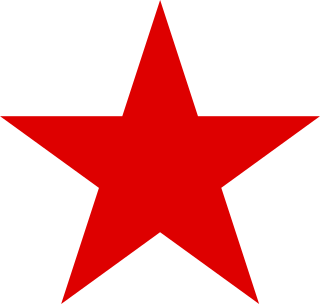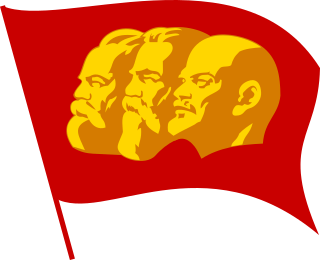
The Communist Party of Canada is a communist political party in Canada founded in 1921 under conditions of illegality. Although it is now a political party without any parliamentary representation, the party's candidates have been elected to the Parliament of Canada, the Ontario legislature, the Manitoba legislature, and various municipal governments across the country. The party has also contributed significantly to trade union organizing and labour history in Canada, peace and anti-war activism, and many other social movements.

William Kashtan (1909–1993) was general secretary of the Communist Party of Canada for 23 years beginning in January 1965, several months following the death of Leslie Morris, until his retirement in 1988. The delay in his assuming the position was due to the opposition of Tim Buck to his appointment.

The Partido Komunista ng Pilipinas-1930 (PKP-1930) is a communist party in the Philippines established on November 7, 1930. It uses the aforementioned appellation in order to distinguish itself from its better known splinter group, the Communist Party of the Philippines.
John Patrick Ducker AO, Australian labour leader and politician, played a leading role in the Australian labour movement and the Labor Party for 20 years.
Social movement unionism (SMU) is a trend of theory and practice in contemporary trade unionism. Strongly associated with the labour movements of developing countries, social movement unionism is distinct from many other models of trade unionism because it concerns itself with more than organizing workers around workplace issues, pay and terms and conditions. It engages in wider political struggles for human rights, social justice and democracy. Social movement unionism grew out of political struggles in developing countries and was theorized as a distinct industrial relations model in the late 1980s and early 1990s.

Matthew Woll was president of the International Photo-Engravers Union of North America from 1906 to 1929, an American Federation of Labor (AFL) vice president from 1919 to 1955 and an AFL-CIO vice president from 1955 to 1956.
The Industrial Groups were groups formed by the Australian Labor Party (ALP) in the late 1940s, to combat Communist Party influence in the trade unions.
John Albert Little was an Australian politician. Born in Maryborough, Victoria, he was educated at East Brunswick and Thornbury state primary Schools, before becoming a clicker in a shoe factory in Collingwood, and later an official with the Victorian Boot Employees' Union, of which he was Federal President in 1944 and 1945. In 1952 was awarded a Commonwealth Bank Scholarship for six months, to study unionism and working conditions in the UK, Europe and the US. In 1954 he was elected to the Victorian Legislative Council for Melbourne North, representing the Labor Party.
Guillermo Capadocia (1909-1951) was a Filipino politician and labour leader. He was a prominent leader of the Communist Party in the Philippines (PKP) and different labour movements. During the last one and a half years of his life he was a regional guerrilla commander of the Hukbalahap.
The Collective Labor Movement was a trade union centre in the Philippines.The CLM was founded in 1938 and consisted of 76 radical and liberal trade unions. It represented a regroupment of the leftist sectors of the Filipino trade union movement. CLM was the largest labour organization in the country in the years in the run-up to the Second World War.
The Unión Obrera Democrática Filipina was a trade union center in the Philippines. The organization was the first modern trade union federation in the country; earlier labor groups had been more of mutual aid societies and guilds. The organization had thirty-three affiliated trade unions as of 1902. In 1903 the organization counted 150 affiliated unions, with around 20,000 members in the Manila area. At its peak, the Union Obrera Democratica had approximately 150,000 members in eight provinces of Luzon.
The Labor-Progressive Party was a legal political organization in Canada between 1943 and 1959.
The Congreso Obrero de Filipinas was a trade union federation in the Philippines, established in 1913 and dissolving into a paper organization which vanished towards the end of the 1930s. The TOF was the second labor federation in the history of Manila's labor movement.

The Socialist Labour Party was a socialist political party in the United Kingdom. It was established in 1903 as a splinter from the Social Democratic Federation (SDF) by James Connolly, Neil Maclean and SDF members impressed with the politics of the American socialist Daniel De Leon, a Marxist theoretician and leading figure of the Socialist Labor Party of America. After decades of existence as a tiny organisation, the group was finally disbanded in 1980.
The International Communist Seminar (ICS) was an annual communist conference held in Brussels, Belgium in May. It was organized by the Workers' Party of Belgium (WPB).
The Jewish left consists of Jews who identify with, or support, left-wing or liberal causes, consciously as Jews, either as individuals or through organizations. There is no one organization or movement which constitutes the Jewish left, however. Jews have been major forces in the history of the labor movement, the settlement house movement, the women's rights movement, anti-racist work, and anti-fascist and anti-capitalist organizations of many forms in Europe, the United States and modern-day Israel. Jews have a rich history of involvement in anarchism, socialism, Marxism, and Western liberalism. Although the expression "on the left" covers a range of politics, many well-known figures "on the left" have been of Jews who were born into Jewish families and have various degrees of connection to Jewish communities, Jewish culture, Jewish tradition, or the Jewish religion in its many variants.

Hoxhaism is a variant of anti-revisionist Marxism–Leninism that developed in the late 1970s due to a split in the Maoist movement, appearing after the ideological dispute between the Communist Party of China and the Party of Labour of Albania in 1978. The ideology is named after Enver Hoxha, a notable Albanian communist leader.

Anti-revisionism is a position within Marxism–Leninism which emerged in the 1950s in opposition to the reforms of Soviet leader Nikita Khrushchev. Where Khrushchev pursued an interpretation of Leninism that differed from his predecessor Joseph Stalin, the anti-revisionists within the international communist movement remained dedicated to Stalin's ideological legacy and criticized the Soviet Union under Khrushchev and his successors as state capitalist and social imperialist due largely to its hopes of achieving peace with the United States. The term "Stalinism" is also used to describe these positions, but it is often not used by its supporters who opine that Stalin simply synthesized and practiced Leninism.






